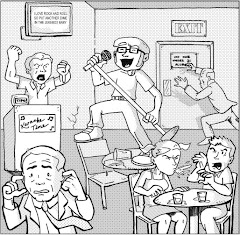"Dead men."
"Rising from their graves."
"Trying to drag me down."
Are these the first three captions of Hardware #8, or President Elect Barack Obama's first thoughts every morning since Wednesday, November 5? After all, every President has had to face the ghosts of the presidency's past, and in these months of transition between George W. Bush's and Barack Obama's terms in office, who knows how many skeletons the good Senator from Illinois has found in the closets of the White House?
Well, the Internet is full of blogs ready and willing to unearth those specters. Actually, it's full of blogs that review comic books, too . . . Anyway, yes, those three captions kick off a haunted issue of Hardware, the inevitable Milestone book I've decided to review in the context of preparing for Obama's anticipated presidency. If Tom Strong taught us about the vulnerability of our reality, and the Seekers showed us subtlety of spirituality, what insight can Hardware offer about black men in positions of power? Simply put, it's like I said . . .
They're haunted.
I've never read Hardware before; in fact, my experience in the Milestone Universe is limited to some select issues of Static Shock and Icon. Near as I can tell, Hardware is a black Iron Man, plain and simple. Brilliant inventor . . . armored alter-ego . . . it's all there on the first page's obligatory origin blurb. This issue, a transition between storylines, I assume, as it seems both tethered to the character's established baggage yet approachable for new readers like me, explores the demons that come with such genius, an aspect of the "self-made armored hero" paradigm firmly established in the mainstream by last summer's blockbuster Iron Man flick. "Woe is me for not using my inventive intellect for good instead of apathy-that-has-led-to-evil sooner! I'll spend the rest of my career in repentance!" The most tender moments in Iron Man, and this entire issue of Hardware -- in a single sentence. No wonder Hollywood never calls.
Seriously, though, writer Dwayne McDuffie uses these twenty-two pages to do what he does best: tell a compelling character-driven story, laced with plenty of societal commentary and action. In Hardware #8, the title character faces the ghosts of his past, from the victims of his superheroic adventures, to the family he forsook to become an inventor, to his mentor-turned-nemesis, to his lost love, to . . . himself. Every episodic encounter boasts a similar theme -- Wake up! -- which, while initially interpreted as a call to integrity, becomes the literal solution when Hardware awakes and realizes the misadventure was a nightmare. McDuffie definitely seizes this opportunity to pull aside the veil on Hardware's inspirations, citing the traditional African trickster tale as the proverbial outline for his armored hero's literary basis. While some might consider this a writer's faux pas, I perceive the move as shedding light on what is to pave the way for what's to come. In the end, Hardware muses, "I can't make up for what I've done. But I can live up to my ideals from now on. I can do better." In other words, some skeletons are best dragged out of the closet so they can finally be buried.
The Obama connection is obvious. First of all, any man, white, black, or green (that's if he's choking at an ambassador's dinner table or something), must face the legacy of his leadership before tackling the role as his own. From the department store manager that inherits a part-time team he didn't hire to the CEO of a corporation facing the realities of America's capitalism and economy, any and every position of authority is burdened some degree of context and challenge that demands sacrifice to be overcome. In the case of the presidency, the concept of collateral damage ranges from firing federal employees to the loss of human life on the battlefield, both of which are ironically equally criticized. How many nightmares will Obama suffer his first year in office? Will they look anything like McDuffie's analysis in Hardware #8?
The comic book medium isn't without similar ghosts. I mentioned McDuffie's "Teenage Negro Ninja Thrashers" pitch a few posts ago -- which is a hilariously biting treatise for Marvel Comics' penchant for jive-talking, skateboarding, young black superheroes. His Milestone line (slated to return to DC continuity soon enough) is essentially the fulfillment of that brief in-office satire, establishing a canon of black heroes with a wide range of nobility and strife -- everything that makes for a fun superhero story. He took his own advice and decided to do better. That's all anybody can do, face to face with the past. The key is one's capacity for honest introspection . . . and I don't think that's something one can learn. The ability to examine oneself . . . should come with one's hardware.
Hardware #8 was published by DC Comics and Milestone Media in October 1993 and was written by Dwayne McDuffie, illustrated by J.J. Birch and Jason Minor, colored by Noelle Giddings, and edited by Steve Dutro.
Tuesday, November 25, 2008
Take a Hard Look at Yourself: Hardware #8
Subscribe to:
Post Comments (Atom)



1 comment:
It has every one of the strength gossip official statement so as soon as I acquire in the way of indicate this site to ease I have been greatly helpful plus I take for recognized it very compulsory all crowd of people.
BMW 320 Air Conditioner Compressor
Post a Comment